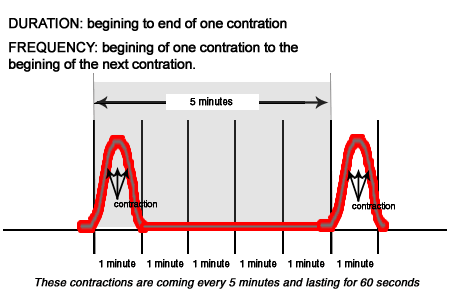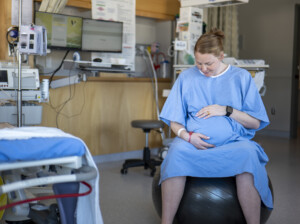A question that every pregnant woman who plans to have their baby in a hospital is . . . When is the right time to go to the hospital when in labor? Many women get so excited by the first contractions that when they finally start getting stronger and more frequent, they head straight to the hospital only to get turned away and sent home. Well, I’m about to clear it up for you so you can ensure you’re getting to the hospital at the right time.
If you were to ask your doctor when you should start heading to the hospital when in labor, the answer they will probably give you is when your contractions are 5-1-1 or if your water has broken. What’s 5-1-1? Let me break it down for you.
5 – when your contractions are 5 minutes apart
1 – when your contractions are 1 minute long each
1 – when this has been a consistent pattern for 1 hour

(I recommend downloading a contraction timer app on your phone to keep track of the duration and frequency.)
When women hear this, they will wait until they have reached that 5-1-1 pattern. Then, as soon as it has been an hour, and that’s the consistent pattern, they head straight to the hospital. Many women don’t know that 5-1-1 is when you have finished early labor and just entered into active labor, and you still have hours to go until you meet your baby.
Women also don’t know that their contractions will likely start spacing out once they get to the hospital if they go straight at 5-1-1. Why is that? When you are at home, you are in a familiar and comfortable place. Your body feels more relaxed and safe, and labor can progress faster. When you are in an unfamiliar place, even when trying to relax your body, it tenses up and stalls your labor since it’s in a foreign place.
Unfortunately, I have seen it happen several times. Women think they are ready to go to the hospital and have reached a certain point in their labor, and their labor slows down or stalls once they are at the hospital. You can stay home longer to avoid this from happening. This is why I usually recommend women go to the hospital when their labor is 4-1-1 or 3-1-1. This will significantly reduce your chances of being sent back home.
Now, if your water has broken before contractions have started, that’s a little bit of a different story. When your water breaks, you want to remember this acronym: COAT.
C – Color: What is the color of your water?
If your water is clear, that’s a good thing, but if it has green, black, or brown in it, it means your baby has probably passed their first poop (called meconium). This means that the baby could be in distress. If you see pink or pinky-red, that’s normal. It means that your cervix is dilating, which is what it needs to do to get you to push. If your water is clear, pink, or pinky-red, you have up to 8 hours to get to the hospital. (Hospital standards) If your water has green, black, and/or brown in it, there is meconium, and you need to head to the hospital to ensure your baby is okay.
If women are GBS positive, you will want to go to the hospital sooner since you will need at least two rounds of medication (penicillin) before the baby is born. Penicillin takes about 30 minutes to go through your IV each round, and they administer it every 4 hours. That means you will need to be at the hospital for 4 hours. They will give you the first round once you check in and another round 4 hours later. (If your baby comes sooner than that, it’s okay. I’ve had this happen to a client or two. They will treat the baby after birth to ensure everything is okay.)
O – Odor: What does your water smell like?
Your water shouldn’t have a crazy different smell to it. It should be odorless or have a regular vaginal odor, nothing abnormal. If your water/amniotic fluid smells bad, like a rotten smell or something sour or anything different that doesn’t smell right, it could mean you have an infection and should go to the hospital immediately.
A – Amount: How much of your water came out when it broke?
When you call, the nurse will ask you this because they want to know if the tear was high in the amniotic sac or a low tear. If there was a big gush when your water broke, the tear in the amniotic sac is low. That makes it closer to the cervix and expels the water around the baby’s head, which is a lot more water. On the other hand, if there was just a trickle coming out here and there, there is a high tear in your amniotic sac. So, a little water comes out every time you move or the baby moves.
NOTE: Many women don’t know that when your water breaks, water doesn’t stop coming out until after your baby is born. There isn’t just one gush, and it’s done. Once your water breaks, the water keeps leaking and coming out until your baby is born.
T – Time: What time did your water break?
The nurse will ask you this when you call in. They want to know how much time you have until they need to make some medical decisions. Many doctors require that babies be born within 24 hours after your water has been broken. That is because your chances of developing an infection (chorioamnionitis) are much greater after 24 hours of the water being broken.1 Signs of this is when your temperature rises. This is why they will continuously check your temperature every couple of hours while in labor if your water has broken. Once you reach the 24-hour mark of your water being broken and you are not making enough progress, they will begin planning for a c-section.
NOTE: This is a good reason to rethink them breaking your water too soon. If your doctor or nurse wants to break your water too soon, remember that you are on a clock after they break it. You have to have your baby within 24 hours before they recommend a c-section.
There are also two things to look out for when you think your water breaks: 1) making sure you didn’t pee yourself and 2) making sure your baby continues to move.
There have been many women who rushed to the hospital who think that their water broke. The nurses then test to make sure that it is amniotic fluid. And then, the test comes back negative that it’s not amniotic fluid. Instead, it is, more than likely, just urine. If this happens to you, don’t be embarrassed. You are not the first woman to have this happen; you certainly won’t be the last. To make sure that your water truly broke, here’s what you can do:
- Go to the restroom and try to empty your bladder.
- Then, go to your room and lie completely flat on your bed for a minute or two.
- Finally, you will get up and check to see if any more fluid came out when you sat up.
When you get up, your water should come out more since you’ve moved around and your bladder is empty. If nothing came out, it was probably pee. So, unfortunately, there will be no need to try and get contractions going or get ready for the hospital.
The second thing to look out for is that the baby is still moving. Call your doctor or midwife if your baby is not moving like normal, and head to the hospital immediately so they can evaluate your baby. Though rare, the umbilical cord may have slipped through your cervix and into the birth canal (called cord prolapse). This only happens in 1 in 300 births, but it’s something to look out for because that cord is your baby’s lifeline.2 If you think this has happened, get on your knees, and keep your tush in the air and face to the ground. This uses gravity to remove pressure off the umbilical cord, which helps keep your baby breathing and their heart beating. Call an ambulance or IMMEDIATELY go to the hospital.
So, to recap, here’s when to go to the hospital in labor:
1. When your contractions are 4-1-1 or 3-1-1.
2. When your water has been broken, and you have developed some contractions. (Within 8 hours of it breaking.)
3. If your water has a foul smell, it has green, black, or brown in it, or if the baby stops moving.
If you’re a first-time mom, listen to our podcast episode about going to the hospital in labor as a first-time mom.














